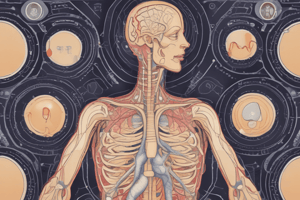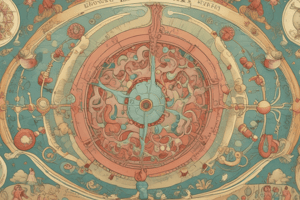Podcast
Questions and Answers
What hormone is produced by the pituitary gland and is responsible for growth?
What hormone is produced by the pituitary gland and is responsible for growth?
- Thyroxine (T4)
- Adrenaline
- Insulin
- Growth Hormone (GH) (correct)
Which hormone is responsible for regulating blood sugar levels?
Which hormone is responsible for regulating blood sugar levels?
- Thyroxine (T4)
- Adrenaline
- Insulin (correct)
- Progesterone
What is the primary function of endocrine glands?
What is the primary function of endocrine glands?
- To release hormones directly into the bloodstream (correct)
- To release chemicals into ducts
- To control metabolism and energy
- To filter waste products from the bloodstream
What role do target cells play in the endocrine system?
What role do target cells play in the endocrine system?
Which glands are responsible for fight, flight, or freeze reactions?
Which glands are responsible for fight, flight, or freeze reactions?
What is the primary difference between endocrine and exocrine glands?
What is the primary difference between endocrine and exocrine glands?
The pancreas is exclusively an endocrine gland.
The pancreas is exclusively an endocrine gland.
Name a hormone produced by the adrenal glands.
Name a hormone produced by the adrenal glands.
The hormone that stimulates the kidneys to hold water is called ______.
The hormone that stimulates the kidneys to hold water is called ______.
Match the following hormones with their functions:
Match the following hormones with their functions:
Which hormone is responsible for growth?
Which hormone is responsible for growth?
Target cells have specific receptors for hormones.
Target cells have specific receptors for hormones.
What role do ovaries play in the endocrine system?
What role do ovaries play in the endocrine system?
The gland known as the 'master gland' is the ______.
The gland known as the 'master gland' is the ______.
Which hormone is produced by the testes?
Which hormone is produced by the testes?
Flashcards are hidden until you start studying
Study Notes
Endocrine vs Exocrine Glands
- Exocrine glands release chemicals into ducts, such as sweat, tears, and digestive juices
- Endocrine glands release chemicals directly into the bloodstream, these chemicals are called hormones
- Examples of hormones include testosterone, estrogen, and insulin
Endocrine System Terminology
- Glands release products directly into the bloodstream
- Hormones are chemical messages carried around the body
- Target cells have specific receptors on their cell membrane which allow them to receive hormonal messages
Pituitary Gland
- It is known as the master gland because it controls other glands
- The pituitary gland releases Growth Hormone (GH) which is responsible for growth. Too little GH results in dwarfism, while too much results in gigantism.
- The pituitary gland also releases Antidiuretic Hormone (ADH), which stimulates the kidneys to retain water
Thyroid Gland
- The thyroid gland controls metabolism and energy in the body.
- It releases thyroxine (T4)
Adrenal Glands
- Adrenal glands are responsible for the fight, flight or freeze response
- Adrenaline increases heart rate and blood pressure, and supplies more oxygen to muscles and organs to allow for a quick response
Pancreas
- The pancreas is an endocrine and exocrine gland
- It releases enzymes and hormones
- The pancreas releases glucagon and insulin, which regulate blood sugar
Ovaries
- Ovaries produce progesterone and estrogen
- The ovaries are responsible for puberty and sexual maturity
Testes
- Testes produce testosterone.
- The testes are responsible for puberty and sexual maturity
Endocrine & Exocrine Glands
- Exocrine glands release chemicals into ducts, examples include sweat, tears and digestive juices
- Endocrine glands release chemicals into the bloodstream, they have no ducts and their chemicals are called hormones, examples include testosterone, estrogen and insulin
Endocrine System Terminology
- Glands: release products into the bloodstream directly
- Hormones: chemical messages carried around the body
- Target cells: specific cells that have appropriate receptors on their cell membrane
Pituitary Gland
- Also known as the master gland, because it controls the other glands
- Growth Hormone (GH) is responsible for growth, too little GH leads to dwarfism and too much GH leads to giantism
- Antidiuretic Hormone (ADH) stimulates kidneys to hold water
Thyroid Gland
- Controls metabolism and energy in the body
- Thyroxine (T4) is the hormone produced by the thyroid gland
Adrenal Glands
- Hormones made by the adrenal glands including adrenaline are responsible for fight, flight or freeze reactions
- Adrenaline increases heart rate and blood pressure, supplies more oxygen to the muscles and organs to help you respond quickly
Pancreas
- An endocrine and exocrine gland that makes enzymes and hormones
- Regulates blood sugar by means of the hormones glucagon and insulin
Ovaries
- Produces progesterone and estrogen
- Function: controls puberty and sexual maturity
Testes
- Produces testosterone
- Function: controls puberty and sexual maturity
Studying That Suits You
Use AI to generate personalized quizzes and flashcards to suit your learning preferences.




